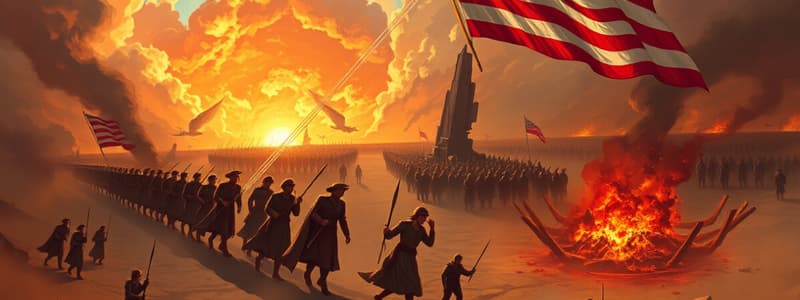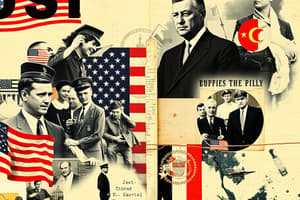Podcast
Questions and Answers
What belief did George Washington hold regarding the United States' role in foreign affairs?
What belief did George Washington hold regarding the United States' role in foreign affairs?
- The U.S. should maintain isolationism. (correct)
- The U.S. was destined to control other nations.
- The U.S. should establish colonies abroad.
- The U.S. should engage actively in global politics.
Which philosophy suggested that some countries were inherently better suited to control others?
Which philosophy suggested that some countries were inherently better suited to control others?
- Social Darwinism (correct)
- American Exceptionalism
- Isolationism
- Manifest Destiny
Which territory did the United States NOT acquire after the Spanish-American War?
Which territory did the United States NOT acquire after the Spanish-American War?
- Cuba
- Puerto Rico
- Hawaii (correct)
- Guam
What event marked the beginning of the United States' expansion of influence globally after its isolationist period?
What event marked the beginning of the United States' expansion of influence globally after its isolationist period?
What organization formed in 1898 opposed American imperialism?
What organization formed in 1898 opposed American imperialism?
Flashcards are hidden until you start studying
Study Notes
Overview of Imperialism
- Imperialism involves a powerful nation controlling another country through military, economic, and political means.
- Historical context: The United States was initially isolationist post-independence from Great Britain in 1783.
Early Isolationism
- George Washington advocated for isolationism to avoid foreign entanglements for the newly independent U.S.
Shift Towards Expansion
- After the Civil War (1865), the U.S. began expanding its influence globally.
- Social Darwinism influenced this expansion; it posited that success and power were due to inherent superiority, leading to International Darwinism concepts.
Key Territorial Expansions
- Initial expansion began with Alaska and Hawaii.
- The U.S. gained further territories following the Spanish-American War in 1898.
Post-War Influence
- After World War II, U.S. control extended to regions like Vietnam and Korea, reflecting continued imperialist policies.
Opposition to Imperialism
- The Anti-Imperialist League formed in 1898 against U.S. foreign involvement but was no longer active by 1920.
Modern Context
- Contemporary references to American imperialism are often linked to U.S. engagement in the Middle East.
Studying That Suits You
Use AI to generate personalized quizzes and flashcards to suit your learning preferences.




